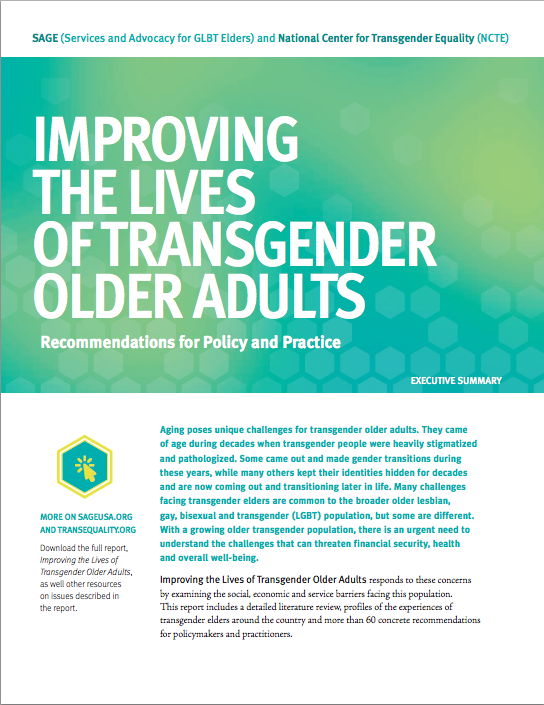Executive Summary
 Aging poses unique challenges for transgender older adults. They came of age during decades when transgender people were heavily stigmatized and pathologized. Some came out and made gender transitions during these years, while many others kept their identities hidden for decades and are now coming out and transitioning later in life. Many challenges facing transgender elders are common to the broader older lesbian, gay, bisexual and transgender (LGBT) population, but some are different. With a growing older transgender population, there is an urgent need to understand the challenges that can threaten financial security, health and overall well-being.
Aging poses unique challenges for transgender older adults. They came of age during decades when transgender people were heavily stigmatized and pathologized. Some came out and made gender transitions during these years, while many others kept their identities hidden for decades and are now coming out and transitioning later in life. Many challenges facing transgender elders are common to the broader older lesbian, gay, bisexual and transgender (LGBT) population, but some are different. With a growing older transgender population, there is an urgent need to understand the challenges that can threaten financial security, health and overall well-being.
Improving the Lives of Transgender Older Adults responds to these concerns by examining the social,economic and service barriers facing this population. This report includes a detailed literature review, profiles of the experiences of transgender elders around the country and more than 60 concrete recommendations for policymakers and practitioners.
SNAPSHOT: KEY CHALLENGES FACING TRANSGENDER OLDER ADULTS
AGING SERVICE BARRIERS
Today’s aging services network provides a wide range of critical services for older adults, from meals and transportation to educational activities and legal help. Yet this network is currently ill-equipped to provide competent and nondiscriminatory services to transgender older adults, or to address their unique needs. Few aging providers offer cultural competence training or outreach specific to transgender communities. Many transgender older adults are not getting the support they need,and many are reluctant to seek services at all.
HEALTH CARE BARRIERS
A lack of cultural and clinical competence regarding transgender people and their health needs,as well as bias and outright discrimination by providers,create serious barriers to quality care for transgender older adults. These barriers, together with financial barriers, mean that many transgender older adults often avoid or delay seeking care. In addition, medically necessary care related to gender transition is often arbitrarily excluded from public and private insurance. Inability to access this care can contribute to declining health,and these exclusions are often also used to deny coverage for preventive and other medical care transgender older adults need.
HEALTH DISPARITIES
The confluence of widespread discrimination across the lifespan, weaker support networks,and barriers to quality care contribute to poor health outcomes for many transgender older people. Transgender people report higher rates of disability, general poor health, depression,anxiety, loneliness and suicidal ideation. Thus, many transgender elders enter their later years with severe health concerns yet without the social and community supports to manage their health.

